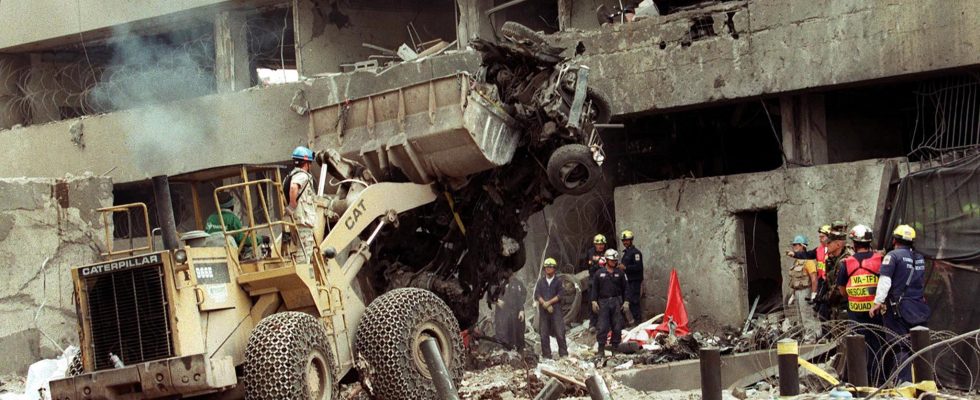Twenty-five years ago, East Africa was struck by terror. On August 7, 1998, truck bombs exploded in front of the American embassies in Nairobi, Kenya and Dar es Salaam, Tanzania. These attacks, claimed by a cell of a local al-Qaeda group, caused 224 deaths and more than 4,000 injuries. Until then unknown to the general public, the terrorist organization was making its debut on the international scene. And 25 years later, many victims are still hoping for compensation.
4 mins
From our correspondent in Nairobi
On August 7, 1998, around 10:30 am, a truck arrived at the parking lot of the American Embassy, located in the center of Nairobi, Kenya. Gunshots are heard, then an explosion. The windows of the embassy are blown and the adjacent building destroyed. A few minutes later, a truck explodes at the entrance to the American Embassy in Dar es Salaam, Tanzania.
The modus operandi is new in sub-Saharan Africa. The extent of the carnage marks the spirits. It was not al-Qaeda’s first attack, but events demonstrate its striking capability. In Nairobi, 213 people are killed, while 11 lose their lives in Dar es Salaam.
The American response is not long in coming. Washington carries out strikes a few days later in Sudan and Afghanistan. Osama bin Ladenthe leader of al-Qaeda, was designated by the United States as the mastermind of the operation and became public enemy number 1. The two attacks are now considered by many to be the beginnings of the September 11, 2001 attacks on American soil.
Read alsoThree years before 9/11, the attacks in Nairobi and Dar es Salaam
Kenya was then hit hard by terrorism, after sending troops in 2011 to fight Al-Shabaab Islamists in Somalia. Westgate Shopping Center Attack in Nairobi killed 67 people in 2013. And 148 people were killed in the attack on the University of Garissa in 2015.
” Without compensation, we don’t feel equal »
During the weekend of August 5-6, survivors of the attacks of August 7, 1998 and their families gathered in Nairobi on the site of the former American embassy, in memory of the victims of the attack.
Twenty-five years later, Caroline Muthoka has not forgotten that one. She was in the next building: I remember being going down the floors and seeing the bodies, I remember the screams… Even today, when I hear a boom, it panics me. It’s still in me. Many of us suffer from post-traumatic stress disorder. And it’s already been 25 years… When are we going to be compensated? »
In 2021, Washington announced compensation for US citizens and embassy staff who were victims of the attack. Sudan, accused of supporting al-Qaeda, agreed to pay $335 million in compensation after spending an agreement with Washington which, in exchange, removed it from its blacklist of state sponsors of terrorism. An agreement which the Kenyan victims did not benefit from, who are therefore still campaigning for compensation.
Some say they received compensation for the first three years. But this is far from enough, according to them. Some victims still have to pay medical bills. Douglas Sidialo is among those calling for Nairobi to cover these costs and compensation from the United States, similar to what has been done for American citizens and embassy staff. . He was driving when the explosion happened and lost his sight 25 years ago:
” We suffered the same pains. Be it the widows, the orphans, the wounded, anyone whose life changed that day. Compensation will not bring back what the victims have lost, but it is a way of saying ”we suffered together and we say ‘pole’, ‘sorry’ in Swahili”. Without it, we Kenyans do not feel we are seen as equals. »
Caroline and Douglas say they remain hopeful of receiving compensation. A committee has just been formed within the Kenyan Senate to support their request to the American authorities.
